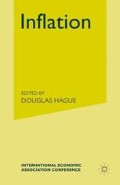Abstract
Trade union structure varies in different countries, and the role of labour union power in inflation varies accordingly. This is true not merely with respect to the amount of power, but, much more important, with respect to its nature and to the context in which it operates. The conditions envisaged in this paper are mainly those of the economy of the U.S.A. However, I believe (and hope) that the arguments presented will have general validity wherever similar conditions are found. It will be assumed that stable prices are desirable, with no rebuttal attempted against those who like inflation (only a little, of course, and not too fast). The definition of inflation is also not discussed — it does not appear necessary to limit the positions here taken by tying them to any particular definition.
Access this chapter
Tax calculation will be finalised at checkout
Purchases are for personal use only
Preview
Unable to display preview. Download preview PDF.
Notes
Thus Milton Friedman, who ridicules cost-push inflation by asking in effect why there should be one theory of inflation (for the U.S.A.) from 1776 to 1955, and another from 1955 to the present. Proceedings of the Eleventh Annual Meeting, Industrial Relations Research Association, 1958, pp. 212–13.
Roscoe Pound, Legal Immunities of Labour Unions, American Enterprise Association, Washington D.C., 1957.
Some suggestions are given in my essay, ‘Labor Union Power and the Public Interest’, in The Public Stake in Union Power, Philip D. Bradley, ed., University of Virginia Press, 1959.
More recently, Professor Slichter has written (in a monthly economic letter for May–June 1959 appearing in the Nihon Keizai Shimbun of Tokyo) that ‘one of the most striking changes in the American economy in the last several years has been the conspicuous decline in the prestige of trade unions … it has gradually become more and more apparent to the country that unions are simply another group pursuing the narrow selfish interests of their members and caring little what general social and economic effects they may be producing. … The decline in the moral influence of trade unions will affect their strength as bargaining organisations’ (by loss of public support). Hence it ‘may well go far to reduce the seriousness of the problem of creeping inflation and perhaps eliminate the problem altogether, at least for the time being’.
Author information
Authors and Affiliations
Editor information
Editors and Affiliations
Copyright information
© 1962 International Economic Association
About this chapter
Cite this chapter
Chamberlin, E.H. (1962). Labour Union Power and Cost-Inflation. In: Hague, D.C. (eds) Inflation. International Economic Association Series. Palgrave Macmillan, London. https://doi.org/10.1007/978-1-349-08455-5_14
Download citation
DOI: https://doi.org/10.1007/978-1-349-08455-5_14
Publisher Name: Palgrave Macmillan, London
Print ISBN: 978-1-349-08457-9
Online ISBN: 978-1-349-08455-5
eBook Packages: Palgrave Economics & Finance CollectionEconomics and Finance (R0)

